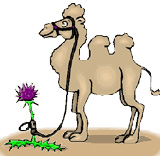 The humps on a camel's back
are actually huge heaps of fat and flesh that can weigh as much as
80 pounds in a healthy camel. These humps help camels survive for
weeks without food and water. The humps on a camel's back
are actually huge heaps of fat and flesh that can weigh as much as
80 pounds in a healthy camel. These humps help camels survive for
weeks without food and water.
When water and food become scarce on the deserts where camels
roam, the fatty humps serve as stored food and are used for
nourishment. As the camel's body metabolizes or uses up the humps' stored fat,
the hump becomes smaller and flabbier. So the longer the camel goes
without eating, the smaller its hump gets. The size of a camel's
hump helps determine a camel's health, food sources, and overall
well-being.
These humps, or reserves of fat, are the reason why camels can go
for days without water and food. While humans are supposed to drink
8 glasses of water a day, camels can go without water for up to 2
weeks!
Camel characteristics:
Camels are the only animals with humps.
Camels can produce up
to 600 liters of milk a year.
Camels can close their nostrils.
Camels eat just about anything.
When camels are really hungry and there is no food around, they
won't think twice about gobbling up people's tents, sandals, or
blankets. |
|
note:
|
hump: 駝峰
metabolize: 新陳代謝
nostril: 鼻孔
| |